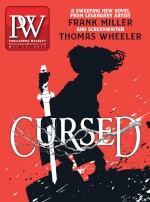Chelsea Girls (Dutton, Aug.) centers on New York’s Chelsea Hotel at the end of WWII and the friendship between budding playwright Hazel Ripley and rising starlet Maxine Mead.
Why the Chelsea Hotel?
I always loved walking by it. I love the architecture. I love that there’s something spooky about it, and that it has this amazing history, with so many different artists and playwrights and musicians having lived there throughout various decades since it opened in 1884.
Why did you choose to set the novel in the theatre world?
It came from an interview for an earlier book, with this amazing woman named Virginia Robinson. She told me about Broadway in the 1950s and was using words and terms that I didn’t know. She talked about Red Channels and loyalty oaths. As she realized I didn’t know what she was talking about, she just got so mad. She started setting me straight about what happened in the 1950s to her and a ton of her theater friends. Once I saw that the Chelsea Hotel had been home to communist organizations I thought, “that’s a perfect match.”
What research did you do on the FBI?
I read Howard Blum’s wonderful In The Enemy’s House, a nonfiction account of FBI agents trying to break the codes of Russian spies. That was helpful, because it’s told from their point of view—what they were doing was valid: there were spies, there were secrets being stolen. Yet, at the same time, there was the HUAC committee, and they were using the threat of real spies to go after people who weren’t spies and to instill fear into Americans. There are two sides to the story, and I wanted to bring that out.
What inspired you to make your lead characters an actress and a writer?
My best friends are people I’ve known for 30 years and acted with, and I think, when you’ve acted with someone, you form a bond that never goes away, because you have these common experiences of putting yourselves on the line and holding each other up. On top of that, as I began writing books and writing fiction, I was embraced by this community of female authors here in New York. I’ve made so many friends with people who are excellent writers and who are not competitive—they’re supporting each other and making sure everybody knows about each other’s books, and they’re meeting for lunch, meeting for a drink, and sharing their experiences. The book is a way of giving thanks for having fallen into those two communities.



 Volume 266
Issue 19
05/13/2019
Volume 266
Issue 19
05/13/2019





